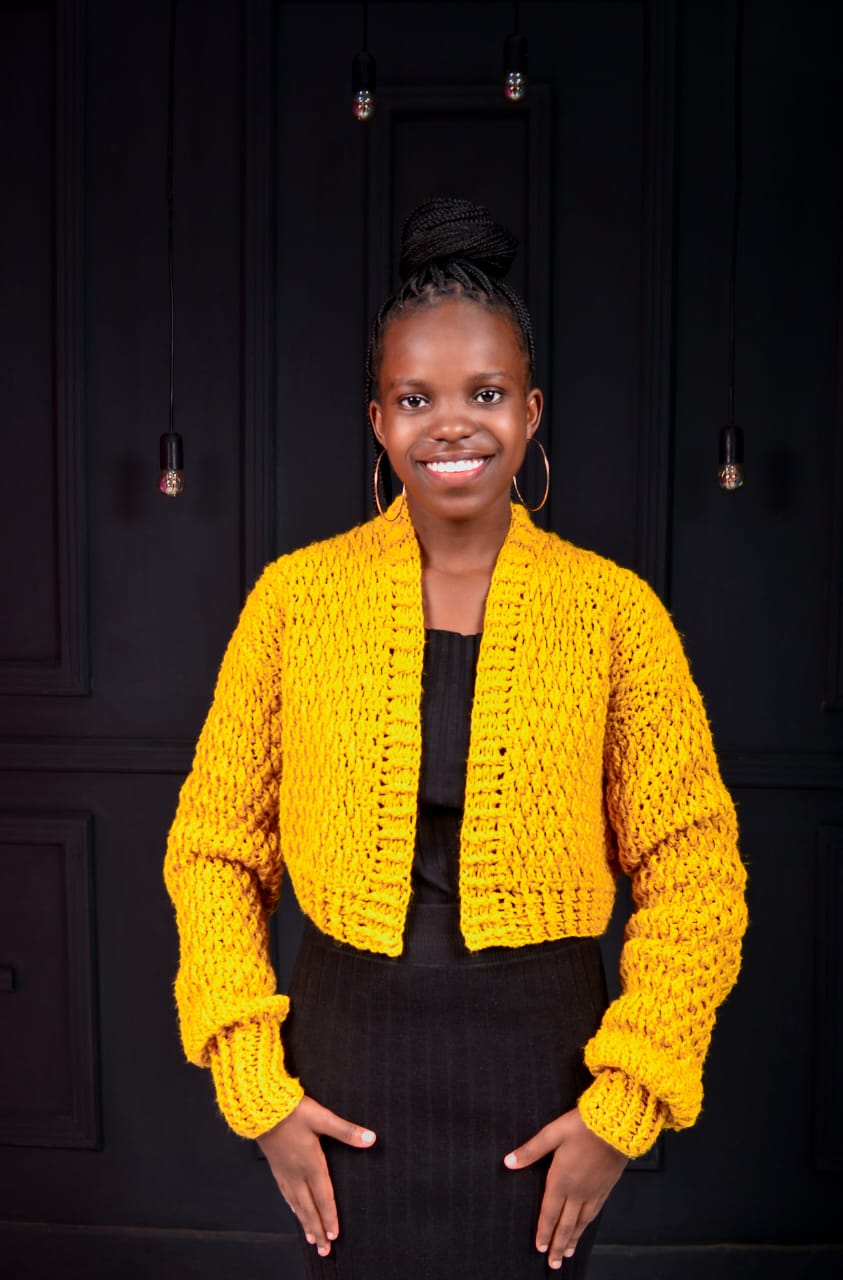
Ivy Mochitsa,Founder,Just Divyne Crochet
- Ivy Mochitsa:Stitching together a dream Business;
Ivy Mochitsa, a 24-year-old graduate in information science, has made a business out of her childhood hobby of crocheting.
As opposed to the majority of graduates who embark on the traditional job seeking, Mochitsa, after some initial disappointments, decided to go for her passion, a decision that has worked out well for her.

Today, she own Just Divyne Crochet business ,making a variety of handmade products and succeeding in marketing them on the global front.
Her products Include scarves, knitted hats, sweaters, and even branded scarves for schools, which says a lot about her flexibility and creativity.
This passion has been converted into a business, and Mochitsa makes a profit of Sh40,000 to Sh50,000 a month.
She receives 15 to 20 clients on a monthly basis.
“I sell my products to schools, companies, individuals whom I have connected with on Facebook, as well as TikTok,” she says.

During the Covid-19 lockdown in 2020, Mochitsa rekindled her crocheting talent, which she had learned at the age of seven.
“When Covid-19 came and forced us to stay at home, I recalled that I had a skill,” she explains.
“I bought some yarns and crocheted a sweater which I sold to my mother.I then made other crochet products and sold them to my neighbors and, with time, I began receiving more and more orders. That’s how my business began.”
She says that she continues to learn new techniques and create new patterns online while crocheting.
Her enthusiasm is echoed in the broad range of products she creates.
“I can make anything you can think of out of yarn,” she says.
Mochitsa began her business alone but partnered with someone who handled marketing and social media management while she focused on design and production.
However, this partnership dissolved when her partner graduated in 2023.

Undeterred by the setback, Mochitsa rebuilt her team to continue her business endeavors.
“I have someone who manages my social media handles and one full-time staff member who helps me to produce things but when I receive very big orders I outsource at least three people. For now I am also training another person whom I will employ on a full-time basis,” she says.
Mochitsa utilizes social media platforms like Facebook, WhatsApp, and Instagram to market her products, reaching customers both locally and internationally.
She also uses more traditional methods, sending samples to organizations and schools.
“Referrals from current customers make the most money for me, though, I either visit their offices with samples or leverage my network for introductions,” she says.
Her networking has yielded tremendous fruit, with customers as far away as Israel placing orders.
“I connected with one of the customers on Facebook after he saw a scarf that I had designed for display with the Israeli flag. He loved it and ordered several scarves which made me believe in the power of social media,” she says.

Quality and customer satisfaction are Mochitsa’s foremost concerns.
“Doing what they want and ensuring that I offer quality products at a reasonable price.
My prices are determined by the hours I spent making them, the quality of crochet hook that I am using and the amount of yarns that I am using and profit margin,” she explains.
She says that she is also going to shift from made-to-order to mass production to better cater to customer demand.
Despite her success, Mochitsa has faced challenges, including the difficulty of securing capital to create samples.
Another challenge came after graduation when her fellow graduates started advising her to seek employment rather than operating her business.
“People supported me as a working woman but after I completed my studies my friends started advising me to get a job thinking that I cannot crochet as a long-term opportunity.
They want me to look for employment but I am not doing that. I would like to grow my business,” she says.
Among the most valuable lessons Mochitsa has learned, she says, is teamwork, because entrepreneurs cannot do everything on their own.
“You need people to work with for your business to grow.
I train my staff to make good quality products and whenever I come up with new patterns I take time to show them how to do it,” she emphasizes.
Her advice to aspiring entrepreneurs is simple: “Start as early as possible so that you can begin to learn, unlearn and understand how to run a business sustainably in the long term.”










